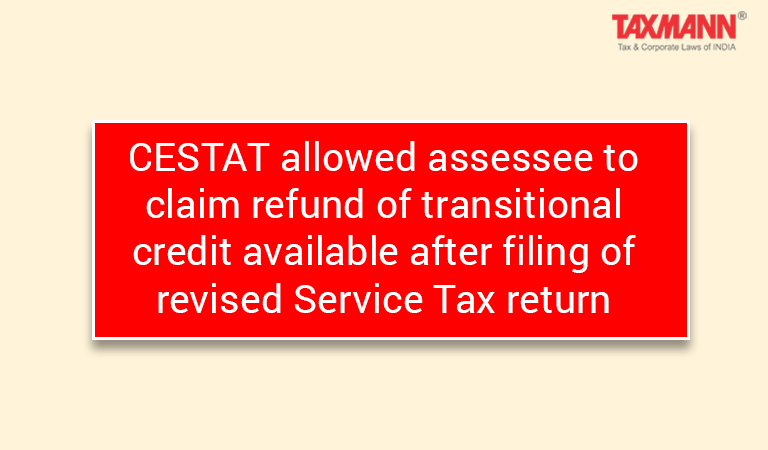CESTAT allowed assessee to claim refund of transitional credit available after filing of revised Service Tax return
- Blog|News|GST & Customs|
- 2 Min Read
- By Taxmann
- |
- Last Updated on 9 September, 2021

Case details: Punjab National Bank v. Commissioner of Central-tax - [2021] 130 taxmann.com 74 (Bangalore - CESTAT)
Judiciary and Counsel Details
-
- S.S. Garg, Judicial Member
- Badrinath, CA for the Appellant.
- Narendrababu P. Byahatti, Superintendent, (AR) for the Respondent.
Facts of the Case
The assessee filed original return of service tax for period April 1st, 2017 to June 30th, 2017 on August 30th. 2017 and disclosed closing balance of cenvat credit of service tax as nil. Subsequently it filed revised return of service tax for aforesaid period on September 4th, 2017 and as a result of which cenvat credit of service tax had increased by Rs. 15.74 lacs. Thereafter assessee filed a claim for refund of Rs. 15.74 lacs on July 30th, 2018 in accordance with provisions of section 142(9)(b) of Central Goods and Services Tax (CGST) Act, 2017.
The Competent Authority as well as Appellate Authority rejected refund claim of assessee on ground that refund was time barred in view of section 11B of Central Excise Act, 1944. It filed appeal before the CESTAT.
CESTAT Held
The honorable CESTAT observed that whenever two options are available, the assessee may choose the option which is more beneficial for them. In instant case, the assessee had chosen to file refund claim under section 142(9)(b) of CGST Act which had overriding effect over section 11B of Central Excise Act. Therefore, the assessee was entitled for refund and matter to be remanded back.
List of Cases Referred to
-
- Uttam Steel Ltd. v. Union of India 2003 (158) ELT 274 (Bom.) (para 3)
- Commissioner v. Voith India (P.) Ltd. 2010 (254) ELT A75 (SC) (para 3)
Disclaimer: The content/information published on the website is only for general information of the user and shall not be construed as legal advice. While the Taxmann has exercised reasonable efforts to ensure the veracity of information/content published, Taxmann shall be under no liability in any manner whatsoever for incorrect information, if any.

Taxmann Publications has a dedicated in-house Research & Editorial Team. This team consists of a team of Chartered Accountants, Company Secretaries, and Lawyers. This team works under the guidance and supervision of editor-in-chief Mr Rakesh Bhargava.
The Research and Editorial Team is responsible for developing reliable and accurate content for the readers. The team follows the six-sigma approach to achieve the benchmark of zero error in its publications and research platforms. The team ensures that the following publication guidelines are thoroughly followed while developing the content:
- The statutory material is obtained only from the authorized and reliable sources
- All the latest developments in the judicial and legislative fields are covered
- Prepare the analytical write-ups on current, controversial, and important issues to help the readers to understand the concept and its implications
- Every content published by Taxmann is complete, accurate and lucid
- All evidence-based statements are supported with proper reference to Section, Circular No., Notification No. or citations
- The golden rules of grammar, style and consistency are thoroughly followed
- Font and size that’s easy to read and remain consistent across all imprint and digital publications are applied



 CA | CS | CMA
CA | CS | CMA
